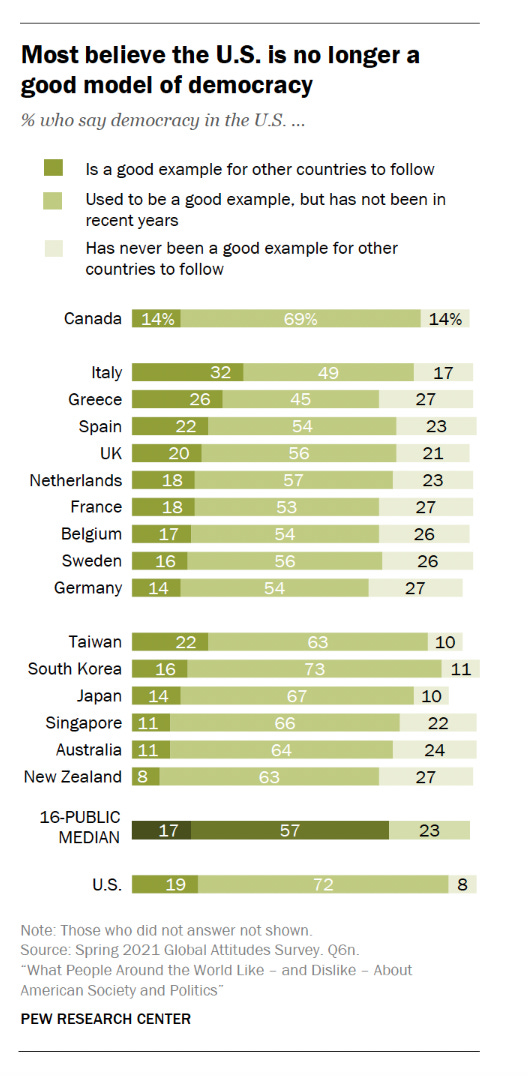
Image via Newsweek
We US Americans need to end our wars. War drains our strength as a nation, and we can’t deal with our other urgent problems – dysfunctional government, financial oligarchy, growing inequality and poverty, drug addiction – until we do. War keeps the world divided, and unable to unite to deal with global problems – catastrophic climate change, pandemics, the migration crisis.
The United States is currently at war with at least six countries – North Korea, Cuba, Iran, Venezuela, Syria and Russia – and is getting ready add a seventh, China. All of these are wars of choice. There is no good reason to be at war with any of these countries.
Technically, of course, we are not at war. Congress has not declared war on any of these countries. No uniformed American troops are fighting troops of any of those countries, at least not directly and not in large numbers.
But this is not how wars are fought today. War is not declared. It is just waged. There is no clear boundary between being at war and being “adversarial.”
War is not limited to fighting by troops. It includes economic warfare, covert warfare, cyber warfare and proxy warfare, all of which can be just as deadly as armed conflict by troops in uniform.
Recently two African governments, Chad and Niger, asked the U.S. government to remove its military bases from their soil. The U.S. Defense Department replied that this is something that will have to be negotiated. Meanwhile U.S. troops are occupying countries against the will of their governments. Is this war?
President Biden has criticized Israel for the mass killing of civilians in Gaza, while continuing to provide Israel with money, weapons and military advisers to use those weapons. Is this war?
When U.S. forces exited Afghanistan in 2021, the U.S. government, along with European allies, blocked the Afghan government from access to its funds in foreign banks, while also cutting off foreign economic aid and grants. The excuse was that the money could be used to help terrorist. The result was a collapse of the Afghan economy and a food crisis. Was this war?
Secretary of State Madeline Albright was famously asked if the blockage of Iraq in the 1990s was worth the deaths of up to 1 million Iraqi children. Her reply was, yes, it was worth it. Was this war? It’s not peace.
My definition of war is that a policy becomes an act of war when it is intended to bring about regime change or when it results in deaths of the innocent. Or if it is something that a government would only do if it were at war.
This includes attempted assassinations of heads of state (Cuba), support of terrorist groups (Cuba, Iran, Syria), economic blockades (North Korea, Cuba, Iran, Venezuela, Syria, Russia), confiscation of financial assets (Iran, Venezuela, Syria, Russia), arming of enemies and rebels (Cuba, Iran, Syria, Russia) and cyber warfare (Iran).
Of course the full extent of cyber warfare and covert warfare is not known. And this is not an exhaustive list of U.S. military operations, not all of which are known to the public.





 Russia, China and now Iran, the most important targets of U.S. sanctions, are now members of BRICS. Venezuela, Cuba, Bolivia, Nicaragua and Vietnam, also targets of U.S. sanctions, are on the waiting list to join.
Russia, China and now Iran, the most important targets of U.S. sanctions, are now members of BRICS. Venezuela, Cuba, Bolivia, Nicaragua and Vietnam, also targets of U.S. sanctions, are on the waiting list to join. The second is a map showing African countries that have military agreements with Russia. I presume this is mainly with the Wagner Group.
The second is a map showing African countries that have military agreements with Russia. I presume this is mainly with the Wagner Group.







 Fool’s Crusade is about the lies that justified NATO intervention in Yugoslavia in the late 1990s. I mostly accepted these lies at the time.
Fool’s Crusade is about the lies that justified NATO intervention in Yugoslavia in the late 1990s. I mostly accepted these lies at the time.




